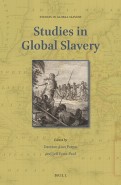 Brill is annoucing the forthcoming series entited « Studies in Global History« .
Brill is annoucing the forthcoming series entited « Studies in Global History« .
For more information : http://www.brill.com/forthcoming-series-studies-global-slavery
Edited by Damian Alan Pargas, Leiden University, and Jeff Fynn-Paul, Leiden University
As an institution in which human beings were held captive and accorded the status of property, could be bought and sold as chattels, and were forced to labor against their will, the institution of slavery predates written records and has existed in innumerable societies. This exciting new series provides a venue for scholarly work—research monographs and edited volumes—that advances our understanding of the history of slavery (defined as ownership of the body rather than simply forced labor, pawnship, indentured servitude or other forms of extreme exploitation) and post-slavery in any period and any geographical region. It fills an important gap in academic publishing and builds upon two relatively recent developments in historical scholarship. First, it provides a world-class outlet for the increased scholarly interest shown in slavery studies in recent years, not only for those working on modern Atlantic societies but also other regions and time periods throughout world history. Second, this series intersects slavery studies with a growing interest in global history among researchers, including global migrations and interactions, warfare, trade routes, and economic expansion. Studies in Global Slavery welcomes submissions that deal with themes such as the development of slave societies and societies with slaves; human trafficking and forced migration; slavery and globalization; slave culture and cultural transfer; political, economic, and ideological causes and effects of slavery; resistance; abolition and emancipation; and memories/legacies of slavery.
The series will publish at least 2 volumes per year. Monographs by specialists in the field are especially sought, but multi-authored edited volumes containing academic articles by slavery scholars will also be considered. Manuscripts should be written in English and be at least 80,000 words in length (including endnotes and bibliography). Manuscripts may also include illustrations, tables, maps, and other visual material.